Photographs: Reuters
The next government must allow RBI to recoup foreign exchange reserves in order to guard against contagion in our uncertain world, says Indranil Sen Gupta.
The biggest challenge the next government (poll results to be declared on May 16) will face is to revive the India growth story.
Yet, I must highlight that growth depends far more on the global cycle than on Delhi. Which is why I’d caution against a 2009-type euphoria on a ‘stable’ mandate or a 2004-type despair on a ‘fragmented’ verdict.
Still, the next five years look better than the past five, especially if a fourth successive stable coalition takes office. I expect annual growth to recover to 7.5 per cent by 2018. There will be US recovery, in contrast to the battle against the Lehman collapse.
Click NEXT for more...
New govt will have to arrest rupee fall, revive economy
Photographs: Vasily Fedosenko/Reuters
Second, increasing US shale gas production should stabilise oil prices, in contrast to the spike of the past.
Finally, reforms undertaken since 2012 will bear fruit, in contrast to the standstill since 2004. A stable political mandate should intensify reforms.
Let us see what has gone wrong, to understand what can turn around. We have decomposed the 300-plus basis point growth slowdown into four factors: (a) the global downturn (150 bps); (b) monetary tightening (75 bps); (c) capex slowdown (50 bps) and poor rains (25 bps).
We do not expect a global recovery till 2015. Delhi, therefore, will have to focus on reviving the domestic investment climate.
Click NEXT for more...
New govt will have to arrest rupee fall, revive economy
Photographs: Danish Siddiqui/Reuters
I expect the next government to further hasten project clearances. Improvement in execution would be the icing on the cake. Still, to incentivise capacity expansion, lending rates need to soften to revive demand.
Although a lot is written about how rising investment spurred the 2004-08 up-cycle, it must not be forgotten that this itself was enabled by then Reserve Bank governor Bimal Jalan’s sustained easing.
However, the capital expenditure cycle is unlikely to pick up till the US turns around in, say, 2015. While we all lament “policy paralysis”, the reality is that the global slowdown is restraining investment.
Our investment deceleration (0.2 per cent from 16.2 per cent in 2007-08) is no worse than Brazil’s (6.3 per cent from 13.9 per cent), Russia’s (-0.3 per cent from 22.7 per cent) and China’s (8.8 per cent from 14.8 per cent).
Click NEXT for more...
New govt will have to arrest rupee fall, revive economy
Photographs: Rupak De Chowdhuri/Reuters
This begs the question of whether rates can be cut if inflation remains high? Of course not.
This is why Delhi needs to adopt the Urjit Patel committee’s proposed inflation targeting framework to contain inflation expectations.
In any case, there has been popular support for an inflation mandate for RBI ever since C Rangarajan’s tightening brought inflation down to five per cent annually from eight per cent in the mid-1990s.
Yet, given supply shocks, the inflation target itself needs to be sufficiently flexible to work.
Click NEXT for more...
New govt will have to arrest rupee fall, revive economy
Photographs: Reuters
While we fancy ourselves hawks, we cannot deny that RBI tightening against rain or oil shocks in the past few years has hurt growth rather than denting inflation.
In reality, competitive monetary easing by G-3 central banks has led to stagflation in emerging markets.
India’s annual inflation, at 8.3 per cent, given 4.7 per cent growth, is certainly no worse than Brazil’s (6.2 per cent inflation, given 1.9 per cent growth) or Russia’s (6.9 per cent inflation, given 0.9 per cent growth).
Click NEXT for more...
New govt will have to arrest rupee fall, revive economy
Photographs: Reuters
Finally, the next government must allow RBI to recoup foreign exchange reserves, as in the Jalan-(Y V) Reddy years, to guard against contagion in our uncertain world.
If this constrains the rupee at weakish 60 to the dollar levels for now, so be it. After all, the import cover — months of imports the forex reserves can fund — has almost halved to eight months, something previously seen in 1997, since 2008.
In consequence, our balance of payments indicators have begun to trail the other BRIC countries. In fact, the resultant 30 per cent depreciation since November 2011 has itself become a source of inflation.
A 10 per cent depreciation impacts inflation by over 100 bps.
Click NEXT for more...
New govt will have to arrest rupee fall, revive economy
Photographs: Reuters
Experience suggests an import cover of eight to 10 months holds the key to rupee stability. We calculate that RBI will need to buy $80 billion in the next two years to only protect the eight-month import cover.
One way to hasten this is to raise $20-25 bn from benchmark debt funds by listing Indian gilts into an emerging market bond index.
Not surprisingly, Governor Raghuram Rajan’s recent initiatives to raise forex reserves is stabilising the rupee.

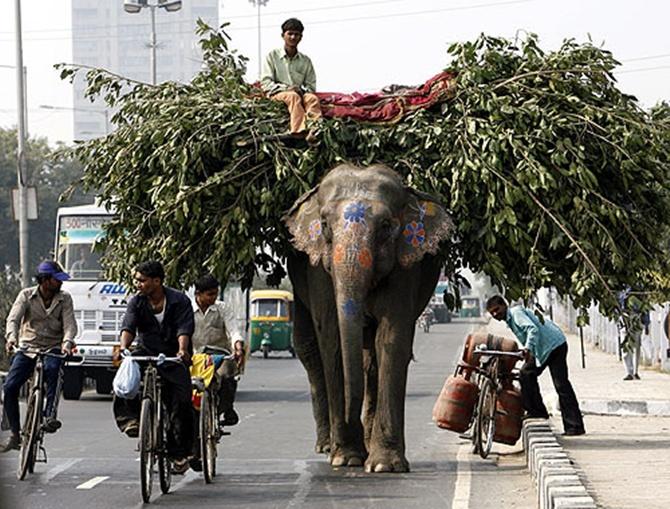
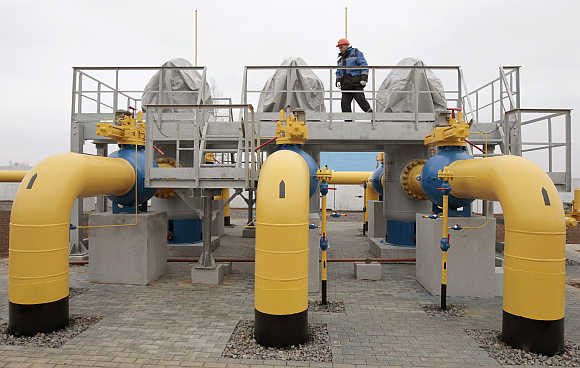
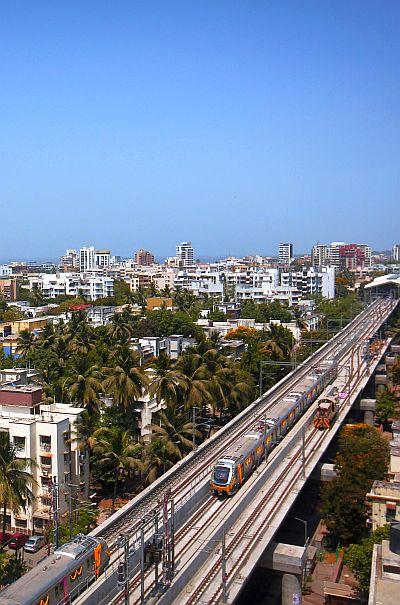
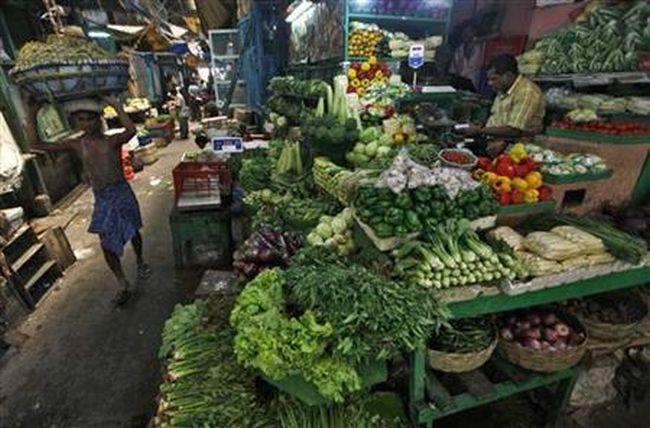
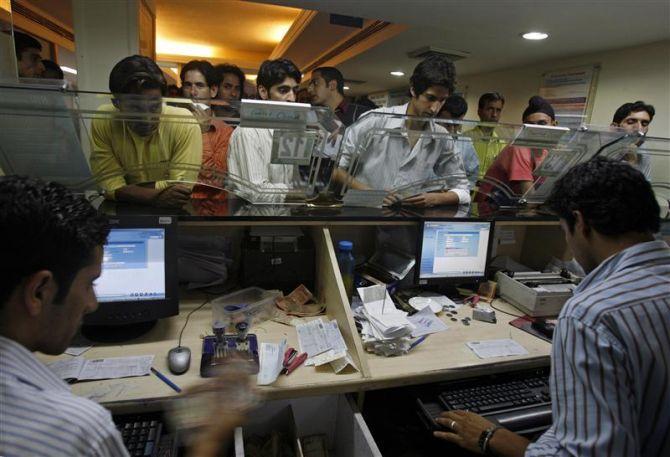
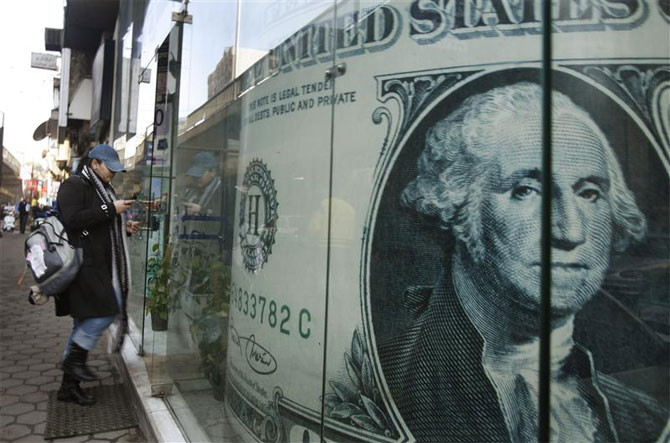
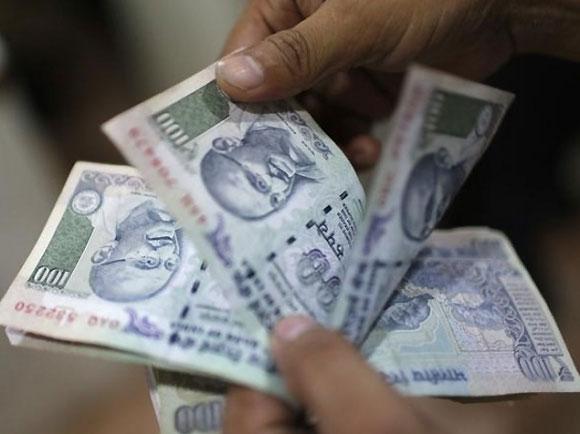

article